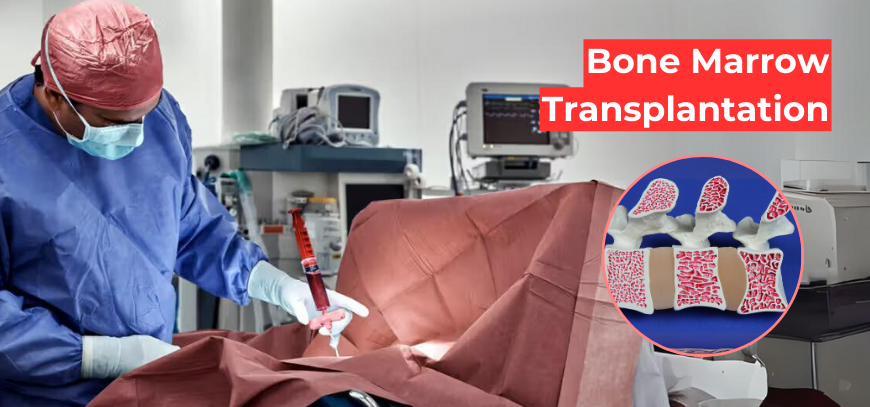Working Time
- Mon-Sat 08:00 – 20:00
Sunday On Appointment
Contact Info
-
Phone: +91 7780297660
Bone Marrow Transplantation

Bone Marrow Transplant in Hyderabad
Dr. S. K. Gupta provides comprehensive bone marrow transplant (BMT) services for patients requiring hematopoietic stem cell transplantation to treat various blood disorders, including leukemia, lymphoma, multiple myeloma, and aplastic anemia. With expertise in autologous, allogeneic, unrelated, and half-matched transplant procedures, Dr. Gupta offers personalized treatment plans tailored to each patient’s specific diagnosis, medical history, and transplant needs. Through his commitment to excellence and patient-centered care, Dr. Gupta ensures the highest quality of care and support for patients undergoing BMT procedures
Autologous Bone Marrow Transplant:
Autologous bone marrow transplant involves harvesting healthy stem cells from the patient’s own bone marrow or peripheral blood and transplanting them back into the patient following high-dose chemotherapy or radiation therapy. Dr. Gupta specializes in autologous BMT procedures, offering personalized treatment plans to optimize transplant success and minimize complications.
Allogeneic Bone Marrow Transplant:
Allogeneic bone marrow transplant involves transplanting stem cells from a compatible donor, such as a sibling, unrelated donor, or cord blood unit, into the patient to replace diseased or damaged bone marrow. Dr. Gupta provides expert care for patients undergoing allogeneic BMT procedures, including donor selection, conditioning regimens, and post-transplant monitoring to ensure successful engraftment and long-term survival.
Unrelated Bone Marrow Transplant:
Unrelated bone marrow transplant involves using stem cells from a donor who is not genetically related to the patient but is compatible based on human leukocyte antigen (HLA) typing. Dr. Gupta offers specialized care for patients undergoing unrelated BMT procedures, coordinating donor searches, facilitating donor-recipient matching, and providing comprehensive support throughout the transplant process.
Half-Matched Transplant:
Half-matched transplant, also known as haploidentical transplant, involves using stem cells from a donor who is a partial match to the patient, typically a parent, child, or sibling. Dr. Gupta specializes in half-matched BMT procedures, optimizing transplant protocols and supportive care measures to improve outcomes and reduce the risk of graft-versus-host disease (GVHD) and transplant-related complications.
Dr. S. K. Gupta, Expert Hematologist in Hyderabad
Dr. S. K. Gupta is a highly respected hematologist with extensive experience in bone marrow transplant and hematopoietic stem cell transplantation. A gold medalist in his field, Dr. Gupta holds MBBS, MD, and DM degrees from AIIMS Delhi, as well as a fellowship in leukemia/BMT/CAR T cells from UBC, Canada. Committed to providing compassionate, patient-centered care, Dr. Gupta combines his expertise with a personalized approach to ensure the best possible outcomes for his patients.
Why Choose Us?
- Expertise: Dr. Gupta is recognized as one of the best hematologists in Hyderabad, known for his expertise in bone marrow transplant procedures and hematopoietic stem cell transplantation.
- Advanced Techniques: Our clinic offers access to the latest advancements in BMT techniques, including reduced-intensity conditioning regimens, haploidentical transplant protocols, and novel immunotherapy approaches.
- Comprehensive Support: We provide comprehensive support services, including donor selection, transplant coordination, and post-transplant follow-up care, to ensure optimal outcomes for our patients and their families.
For bone marrow transplant in Kukatpally, Hyderabad trust Dr. S. K. Gupta, the bone marrow transplant expert in Hyderabad. Contact us today to schedule a consultation and take the first step towards better health and well-being.
Autologous BMT uses the patient’s own stem cells, while allogeneic BMT involves using stem cells from a compatible donor. Autologous transplant is often used for diseases like multiple myeloma, while allogeneic transplant is used for conditions like leukemia and lymphoma.
The bone marrow transplant process typically involves several weeks of preparation, including chemotherapy or radiation therapy to destroy diseased cells, followed by the transplant procedure itself. Recovery and engraftment may take several weeks to months, with ongoing monitoring and supportive care.
The success of bone marrow transplant depends on various factors, including the patient’s overall health, disease type and stage, donor compatibility, and transplant technique. Dr. Gupta will evaluate each patient’s individual case and discuss expected outcomes and prognosis accordingly.
